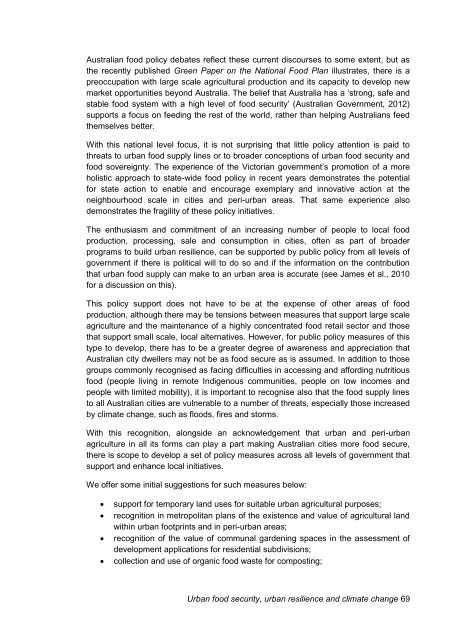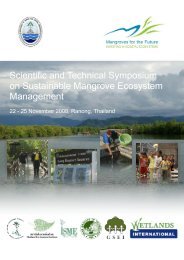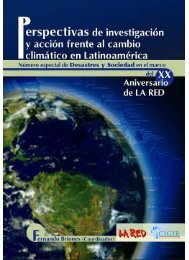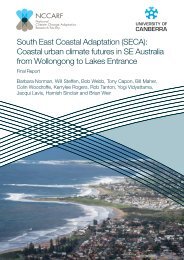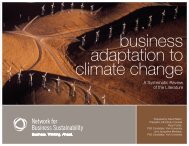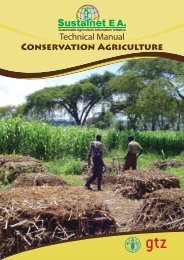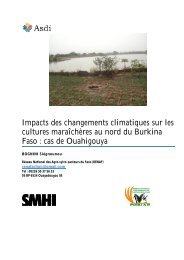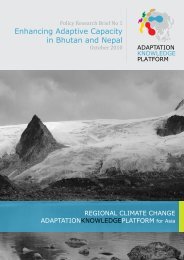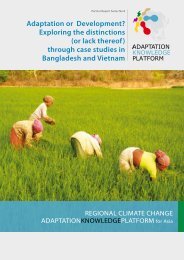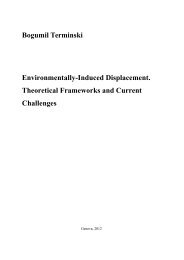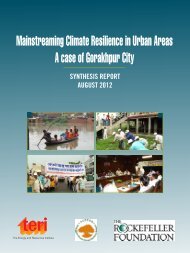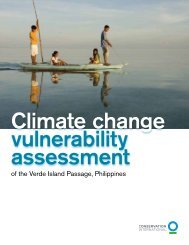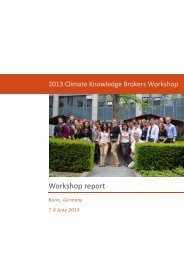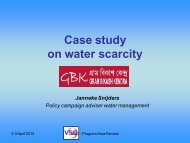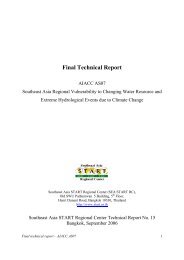Urban food security, urban resilience and climate change - weADAPT
Urban food security, urban resilience and climate change - weADAPT
Urban food security, urban resilience and climate change - weADAPT
Create successful ePaper yourself
Turn your PDF publications into a flip-book with our unique Google optimized e-Paper software.
Australian <strong>food</strong> policy debates reflect these current discourses to some extent, but asthe recently published Green Paper on the National Food Plan illustrates, there is apreoccupation with large scale agricultural production <strong>and</strong> its capacity to develop newmarket opportunities beyond Australia. The belief that Australia has a ‘strong, safe <strong>and</strong>stable <strong>food</strong> system with a high level of <strong>food</strong> <strong>security</strong>’ (Australian Government, 2012)supports a focus on feeding the rest of the world, rather than helping Australians feedthemselves better.With this national level focus, it is not surprising that little policy attention is paid tothreats to <strong>urban</strong> <strong>food</strong> supply lines or to broader conceptions of <strong>urban</strong> <strong>food</strong> <strong>security</strong> <strong>and</strong><strong>food</strong> sovereignty. The experience of the Victorian government’s promotion of a moreholistic approach to state-wide <strong>food</strong> policy in recent years demonstrates the potentialfor state action to enable <strong>and</strong> encourage exemplary <strong>and</strong> innovative action at theneighbourhood scale in cities <strong>and</strong> peri-<strong>urban</strong> areas. That same experience alsodemonstrates the fragility of these policy initiatives.The enthusiasm <strong>and</strong> commitment of an increasing number of people to local <strong>food</strong>production, processing, sale <strong>and</strong> consumption in cities, often as part of broaderprograms to build <strong>urban</strong> <strong>resilience</strong>, can be supported by public policy from all levels ofgovernment if there is political will to do so <strong>and</strong> if the information on the contributionthat <strong>urban</strong> <strong>food</strong> supply can make to an <strong>urban</strong> area is accurate (see James et al., 2010for a discussion on this).This policy support does not have to be at the expense of other areas of <strong>food</strong>production, although there may be tensions between measures that support large scaleagriculture <strong>and</strong> the maintenance of a highly concentrated <strong>food</strong> retail sector <strong>and</strong> thosethat support small scale, local alternatives. However, for public policy measures of thistype to develop, there has to be a greater degree of awareness <strong>and</strong> appreciation thatAustralian city dwellers may not be as <strong>food</strong> secure as is assumed. In addition to thosegroups commonly recognised as facing difficulties in accessing <strong>and</strong> affording nutritious<strong>food</strong> (people living in remote Indigenous communities, people on low incomes <strong>and</strong>people with limited mobility), it is important to recognise also that the <strong>food</strong> supply linesto all Australian cities are vulnerable to a number of threats, especially those increasedby <strong>climate</strong> <strong>change</strong>, such as floods, fires <strong>and</strong> storms.With this recognition, alongside an acknowledgement that <strong>urban</strong> <strong>and</strong> peri-<strong>urban</strong>agriculture in all its forms can play a part making Australian cities more <strong>food</strong> secure,there is scope to develop a set of policy measures across all levels of government thatsupport <strong>and</strong> enhance local initiatives.We offer some initial suggestions for such measures below:support for temporary l<strong>and</strong> uses for suitable <strong>urban</strong> agricultural purposes;recognition in metropolitan plans of the existence <strong>and</strong> value of agricultural l<strong>and</strong>within <strong>urban</strong> footprints <strong>and</strong> in peri-<strong>urban</strong> areas;recognition of the value of communal gardening spaces in the assessment ofdevelopment applications for residential subdivisions;collection <strong>and</strong> use of organic <strong>food</strong> waste for composting;<strong>Urban</strong> <strong>food</strong> <strong>security</strong>, <strong>urban</strong> <strong>resilience</strong> <strong>and</strong> <strong>climate</strong> <strong>change</strong> 69


